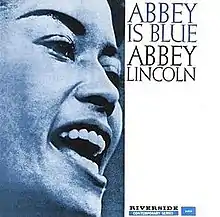| Abbey Is Blue | ||||
|---|---|---|---|---|
 | ||||
| Studio album by | ||||
| Released | 1959 | |||
| Recorded | Spring and Fall, 1959 New York City | |||
| Genre | Jazz | |||
| Length | 39:19 | |||
| Label | Riverside RLP 12-308 | |||
| Producer | Bill Grauer and Orrin Keepnews | |||
| Abbey Lincoln chronology | ||||
| ||||
Abbey Is Blue is the fourth album by American jazz vocalist Abbey Lincoln featuring tracks recorded in 1959 for the Riverside label.[1]
Reception
| Review scores | |
|---|---|
| Source | Rating |
| All About Jazz | |
| AllMusic | |
| DownBeat | |
| New York Age | |
| The Penguin Guide to Jazz Recordings | |
| The Rolling Stone Jazz Record Guide | |
AllMusic awarded the album 4½ stars, with the review by Scott Yanow stating: "Abbey Lincoln is quite emotional and distinctive during a particularly strong set... very memorable".[3] All About Jazz also gave the album 4½ stars, with David Rickert calling it "a breakthrough performance in jazz singing", and observing: "With the civil rights movement looming over the horizon, no longer did singers need to stick with standards and Tin Pan Alley tunes and could truly sing about subjects that mattered to them. Lincoln picked up Billie Holiday's skill at inhabiting the lyrics of a song and projecting its emotional content outward, and these songs, all of which deal with sorrow, are stark and harrowing accounts of loss and injustice."[2]
Track listing
- "Afro Blue" (Mongo Santamaría, Oscar Brown) - 3:20
- "Lonely House" (Langston Hughes, Kurt Weill) - 3:40
- "Let Up" (Abbey Lincoln) - 5:32
- "Thursday's Child" (Elisse Boyd, Murray Grand) - 3:31
- "Brother, Where Are You?" (Oscar Brown) - 3:10
- "Laugh, Clown, Laugh" (Ted Fio Rito, Sam M. Lewis, Joe Young) - 5:24
- "Come Sunday" (Duke Ellington) - 5:13
- "Softly, as in a Morning Sunrise" (Oscar Hammerstein II, Sigmund Romberg) - 2:46
- "Lost in the Stars" (Maxwell Anderson, Kurt Weill) - 4:11
- "Long as You're Living" (Oscar Brown, Julian Priester, Tommy Turrentine) - 2:33
Personnel
- Abbey Lincoln - vocals
- Kenny Dorham (tracks 2, 4, 7-9), Tommy Turrentine (tracks 1, 3, 6, 10) - trumpet
- Julian Priester - trombone (tracks 1, 3, 6, 10)
- Stanley Turrentine - tenor saxophone (tracks 1, 3, 6, 10)
- Les Spann - guitar (tracks 2, 4, 7-9), flute (track 5)
- Wynton Kelly (tracks 2, 4, 5), Cedar Walton (tracks 3, 6), Phil Wright (tracks 7-9) - piano
- Bobby Boswell (tracks 1, 3, 6, 10), Sam Jones (tracks 2, 4, 5, 7-9) - bass
- Philly Joe Jones (tracks: 2, 4, 5, 7-9), Max Roach (tracks: 1, 3, 6, 10) - drums
References
- ↑ Riverside Records discography accessed September 13, 2012
- 1 2 Rickert, David, "Abbey Lincoln: Abbey Is Blue", All About Jazz, October 16, 2005.
- 1 2 Yanow, Scott, AllMusic Review, accessed September 13, 2012.
- ↑ DeMichael, Don (26 May 1960). "Abbey Lincoln: Abbey is Blue". DownBeat. Vol. 27, no. 11. p. 38.
- ↑ Stone, Louise Davis (13 February 1960). "The Jazz Bit". New York Age. p. 12. Retrieved 8 March 2015.
- ↑ Cook, Richard; Morton, Brian (2008). The Penguin Guide to Jazz Recordings (9th ed.). Penguin. p. 894. ISBN 978-0-141-03401-0.
- ↑ Swenson, J., ed. (1985). The Rolling Stone Jazz Record Guide. USA: Random House/Rolling Stone. p. 126. ISBN 0-394-72643-X.